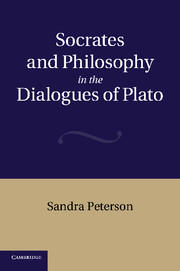Book contents
- Frontmatter
- Contents
- Acknowledgments
- Abbreviations
- Preface
- Chapter 1 Opposed hypotheses about Plato's dialogues
- Chapter 2 Socrates in the Apology
- Chapter 3 Socrates in the digression of the Theaetetus:
- Chapter 4 Socrates in the Republic, part i: speech and counter-speech
- Chapter 5 Socrates in the Republic, part ii: philosophers, forms, Glaucon, and Adeimantus
- Chapter 6 Socrates in the Phaedo: another persuasion assignment
- Chapter 7 Others' conceptions of philosophy in the Euthydemus, Lovers, and Sophist
- Chapter 8 Socrates and Plato in Plato's dialogues
- Chapter 9 Socrates and philosophy
- Bibliography
- Index of passages cited
- General index
- References
Bibliography
Published online by Cambridge University Press: 03 May 2011
- Frontmatter
- Contents
- Acknowledgments
- Abbreviations
- Preface
- Chapter 1 Opposed hypotheses about Plato's dialogues
- Chapter 2 Socrates in the Apology
- Chapter 3 Socrates in the digression of the Theaetetus:
- Chapter 4 Socrates in the Republic, part i: speech and counter-speech
- Chapter 5 Socrates in the Republic, part ii: philosophers, forms, Glaucon, and Adeimantus
- Chapter 6 Socrates in the Phaedo: another persuasion assignment
- Chapter 7 Others' conceptions of philosophy in the Euthydemus, Lovers, and Sophist
- Chapter 8 Socrates and Plato in Plato's dialogues
- Chapter 9 Socrates and philosophy
- Bibliography
- Index of passages cited
- General index
- References
- Type
- Chapter
- Information
- Socrates and Philosophy in the Dialogues of Plato , pp. 262 - 276Publisher: Cambridge University PressPrint publication year: 2011

